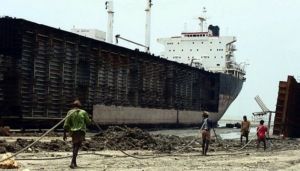News
Denmark signs UN convention for sustainable ship scrapping
This article is more than 8 years old.
Eight more nations needed for convention to go into effect

Not the kind of beach you want to be on (photo: Stéphane M Grueso )
As the seventh nation in the world, Denmark has signed on to the Hong Kong Convention, which aims to better protect the people and environment involved in ship scrapping.
The international maritime organsation, IMO, confirmed that it has received a document in which Denmark expresses its desire to join the convention.
“Obsolete ships typically contain dangerous waste and they must be scrapped under adequate conditions,” said he food and environment minister, Esben Lunde Larsen.
“It’s a good day for those people who work with scrapping ships every time a nation signs the convention, so I’m pleased that Denmark has now finally signed on. Shipping is a global industry where there is a need for mutual international legislation.”
Larsen said that Denmark’s signature sets an example to other nations that it’s important to prioritise the sustainable scrapping of ships.
READ MORE: EU wants to stop Danish shipping giant from scrapping its ships in India
15 needed
Denmark joining the convention also means that it is a step closer to going into effect as it required the backing of at least 15 nations to do so.
Aside from Denmark, Norway, Congo, France, Belgium, Panama and Turkey have also signed the convention.
About 1,000 trade ships are scrapped around the world annually and most are done so in Asia in poor conditions in nations such as Bangladesh.
Recently, the Danish shipping giant Maersk landed itself in hot water when it was revealed that 14 of its ships were being broken up on open beaches in India and Bangladesh.










































